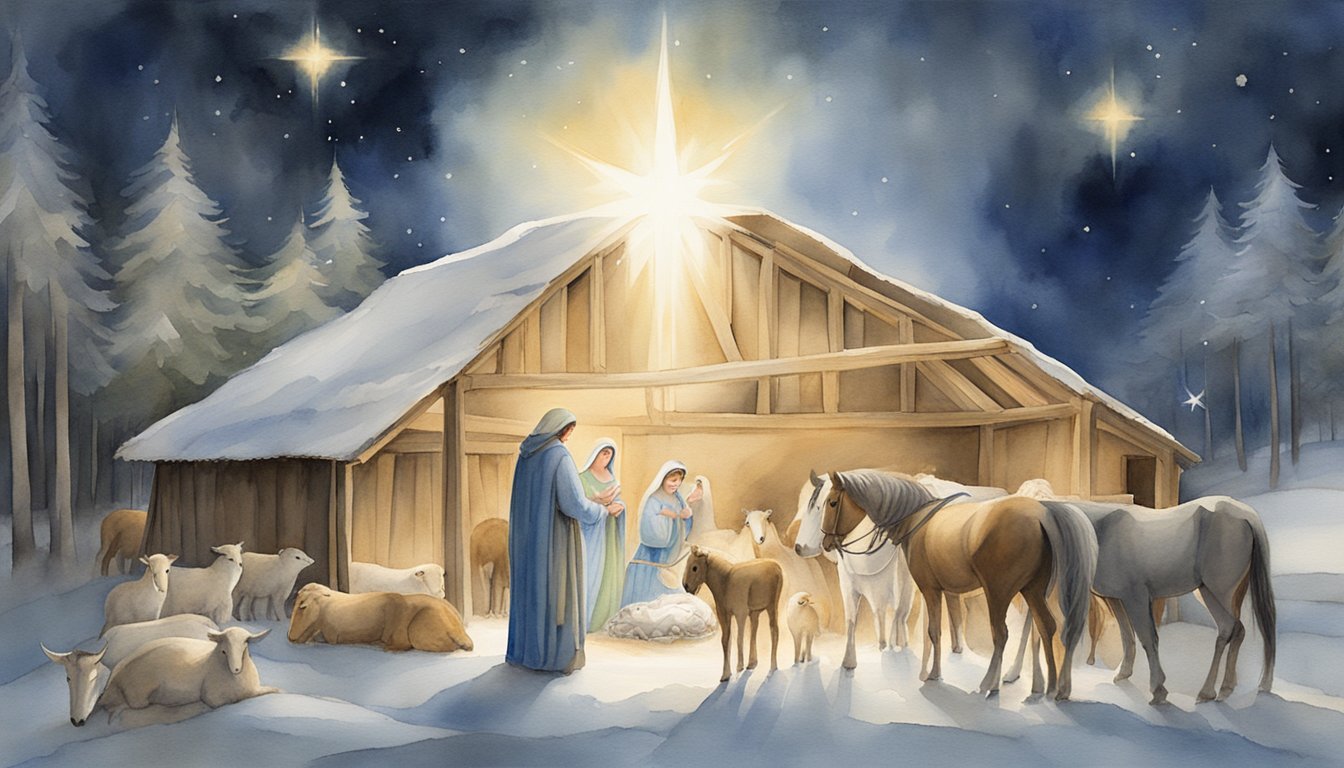Historical Context of Jesus’ Birth
Judean Setting and Political Climate
During the time of Jesus’ birth, Judea was under the control of the Roman Empire. The Jews lived in a fragile political environment, where tensions between the Jewish population and the Roman rulers were not uncommon. Rome appointed rulers, such as Herod the Great, who were responsible for maintaining stability in the region 1.
Herod the Great’s rule was marked by a series of building projects and efforts to improve the economic and cultural life of his subjects, but he was also known for his paranoia and ruthlessness towards his enemies 2.
The Jewish people at that time were expecting the arrival of a Messiah, an anointed leader who would deliver them from foreign oppression and reestablish the rule of God over Israel as it was during the time of King David3.
Key Figures: Mary, Joseph, and Herod the Great
Mary and Joseph, the parents of Jesus, belonged to the line of King David. They were devout Jews who followed all the customs and traditions of their religion. The birth of Jesus was announced to Mary by an angel who told her that she would give birth to the Messiah. Joseph, after learning about Mary’s pregnancy, also received an angelic message in a dream, assuring him that the child was conceived through the Holy Spirit 4.
Herod the Great was the Roman-appointed King of Judea when Jesus was born. He was notorious for his brutality towards his family and subjects. He viewed any potential threat to his power with suspicion and extreme measures. When he heard about the birth of Jesus from the Magi, he saw it as a potential challenge to his authority and ordered the massacre of male infants in Bethlehem, in an attempt to eliminate the newborn king5.
Census and Journey to Bethlehem
According to the Gospel of Luke, a census was conducted during the reign of Caesar Augustus6. As Caesar Augustus was ruling the Roman Empire at the time, he ordered a census to be taken in the provinces, including Syria and Judea. This is one of the key historical events connected with the birth of Jesus.
Joseph and Mary lived in the town of Nazareth, but due to the census, they were required to travel to Bethlehem, the city of David, as Joseph belonged to the line of David. The couple journeyed to Bethlehem, where Mary gave birth to Jesus in a stable7.
The historical context of Jesus’ birth provides insights into the political and religious climate of the era, as well as the expectations and hopes of the Jewish people. By understanding these factors, it becomes evident that Jesus’ birth occurred amidst a complex and turbulent period in human history.
The Birth of Jesus: Narratives and Traditions

Gospel Accounts of the Nativity
The birth of Jesus, also known as the Nativity, holds great significance in Christianity. The biblical gospels of Luke and Matthew provide accounts of Jesus’s birth, which took place in Bethlehem. Mary, Jesus’s mother, was visited by an angel who informed her that she would give birth to a special child while still a virgin. Joseph, her betrothed, decided to stand by her and they traveled from Nazareth to Bethlehem to participate in a census.
During their time in Bethlehem, Mary and Joseph couldn’t find room at an inn and were forced to take shelter in a stable. It was here that Jesus was born and placed in a manger. Shepherds were visited by angels who announced the birth of the Lord and guided them to Jesus. In Matthew’s account, Magi or wise men also came to visit Jesus and brought gifts to honor him.
December 25: Emergence of Christmas
Even though the exact date of Jesus’s birth is not specified in the Gospels, it is traditionally celebrated on December 25 by most Christians worldwide. This date was chosen by the early Christian Church in the 4th century AD to coincide with the Roman festival of Saturnalia, as a way to encourage the conversion of pagans to Christianity.
While some scholars may debate the historical accuracy of December 25 as Jesus’s actual birthdate, it has become an important date for theological reflection and celebration within the Christian tradition.
Modern Celebrations and Reflections
The significance and celebration of the birth of Jesus Christ, also known as Christmas, has evolved throughout history. Today, Christmas is a time when Christians come together to not only celebrate the birth of Jesus but also engage in religious activities, such as attending church services and retelling the Nativity story.
Outside the church, various customs are now associated with Christmas, including the exchange of gifts and the decoration of homes and public spaces. Nativity scenes are commonly displayed, often featuring figurines of Mary, Joseph, baby Jesus, shepherds, and the Magi. Additionally, carolers sing songs to recount the events around Jesus’s birth, further emphasizing the importance of this distinctive moment in Christian history.
Footnotes
-
https://www.thecollector.com/jesus-christ-in-context-rome-jerusalem-judea/ ↩
-
https://www.biblicalarchaeology.org/daily/people-cultures-in-the-bible/jesus-historical-jesus/the-political-implications/ ↩
-
https://www.biblegateway.com/passage/?search=Matthew+1%3A18-25&version=NIV ↩
-
https://www.biblegateway.com/passage/?search=Matthew+2%3A16-18&version=NIV ↩
-
https://www.biblegateway.com/passage/?search=Luke+2%3A1-20&version=NIV ↩

